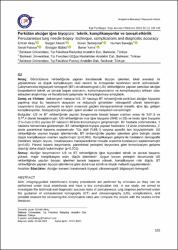Perkütan akciğer iğne biyopsisi: teknik, komplikasyonlar ve tanısal etkinlik

View/
Access
info:eu-repo/semantics/openAccessDate
2023Author
Akay, EmrahMısırlı, Sergen
Demirpolat, Gülen
Sarıoğlu, Nurhan
Serpil Paksoy
Bülbül, Erdoğan
Yanık, Bahar
Metadata
Show full item recordAbstract
Amaç: Görüntüleme rehberliğinde yapılan transtorasik biyopsi işlemleri, lokal anestezi ile yapılabilmesi ve düşük komplikasyon riski nedeni ile klinisyenler tarafından tercih edilmektedir. Çalışmamızda bilgisayarlı tomografi (BT) ve ultrasonografi (US) rehberliğinde yapılan perkütan akciğer biyopsilerinin teknik ve tanısal başarı oranlarını, komplikasyonlarını ve komplikasyonu arttıran olası sebepleri araştırmayı ve literatürdeki çalışmalar ile karşılaştırmayı amaçladık. Gereç ve Yöntem: Seksenyedi hastaya US, 31 hastaya BT rehberliğinde perkütan akciğer biyopsisi yapılmış olup bu hastaların dosyaları ve radyolojik görüntüleri retrospektif olarak taranmıştır. Lezyonların boyutu, yerleşimi ve işlem sırasında geçilen transparankimal mesafe, iğne tipi, gelişen komplikasyonlar, histopatolojik sonuçlar, işlem süreleri ve maliyetleri not edilmiştir. Bulgular: US ve BT rehberliğinde yapılan biyopsilerde tanısal başarı oranları sırası ile %91,9 ve %77,4 olarak hesaplanmıştır. US rehberliğinde ince iğne biyopsisi (İİAB) (n:33) ve kesici iğne biyopsisi (Tru-Cut) (n:54) yapılan 87 hastanın 85’inde komplikasyon gelişmemiştir. Bir hastada pnömotoraks, 1 hastada hematoraks gözlenmiştir. BT rehberliğinde biyopsi yapılan hastaların 14’ünde pnömotoraks, 2’ sinde parankimal kanama saptanmıştır. Yüz dört (%88,1) lezyona spesifik tanı koyulabilmiştir. US rehberliğinde yapılan biyopsi işlemlerinde, BT rehberliğinde yapılan işlemlere göre belirgin olarak düşük komplikasyon oranları saptanmıştır (p<0,001). Komplikasyon gelişimi ile hastaların demografik özellikleri, lezyon boyutu, lokalizasyonu transparankimal mesafe arasında korelasyon saptanmamıştır (p>0,05). Plevral tabanlı lezyonlarda, parankimal yerleşimli lezyonlara göre komplikasyon gelişme olasılığı daha düşük bulunmuştur (p<0,001). Sonuç: Akciğer lezyonlarının US ve BT rehberliğinde iğne biyopsileri teknik ve tanısal başarısı yüksek, majör komplikasyon oranı düşük işlemlerdir. Uygun lezyon yerleşimi durumunda US rehberliğinde yapılan biyopsi işlemleri tanısal başarısı yüksek, komplikasyon riski düşük, BT rehberliğinde yapılan biyopsi işlemlerine göre daha kısa süreli ve düşük maliyetli uygulamalardır. Aim: Imaging-guided transthoracic biopsy procedures are preferred by clinicians as they can be performed under local anesthesia and have a low complication risk. In our study, we aimed to investigate the technical and diagnostic success rates of percutaneous lung biopsies performed under the guidance of computerized tomography (CT) and ultrasonography (US), complications, and possible reasons for increasing the complication rates and compare the results with the studies in the literature. Materials and Methods: Eighty-seven patients underwent US-guided, and 31 patients underwent CTguided percutaneous lung biopsy. The files and radiological images of these patients were scanned retrospectively. The size and location of the lesions, the trans-parenchymal distance crossed during the procedure, needle type, complications, histopathological results, procedure times, and procedure costs were noted. Results: Diagnostic success rates in US and CT guided biopsies were calculated as 91.9% and 77.4%, respectively. No complications developed in 85 of 87 patients who underwent US-guided fine needle (FNAB) (n:33) and cutting needle biopsy (Tru-Cut) (n:54). Pneumothorax was observed in one patient and hemothorax was observed in one patient. Pneumothorax was found in 14 of the patients who underwent CT-guided biopsy, and parenchymal hemorrhage was found in 2 of them. A specific diagnosis could be made for 104 (88.1%) lesions. Significantly lower complication rates were found in US-guided procedures compared to CT-guided biopsy procedures (p<0.001). No correlation was found between the development of complications and the demographic characteristics of the patients, lesion size, localization, and trans-parenchymal distance (p>0.05). Complications were found to be lower in pleural-based lesions compared to parenchymal lesions (p<0.001). Conclusion: US and CT-guided needle biopsies of lung lesions are procedures with high technical and diagnostic success and low major complication rates. In case of appropriate lesion localization, US-guided biopsy procedures have high diagnostic success, low complication risk, shorter duration and lower cost compared to CT-guided biopsy procedures.
Volume
62Issue
1URI
https://doi.org/https://search.trdizin.gov.tr/yayin/detay/1158995
https://hdl.handle.net/20.500.12462/14122

















